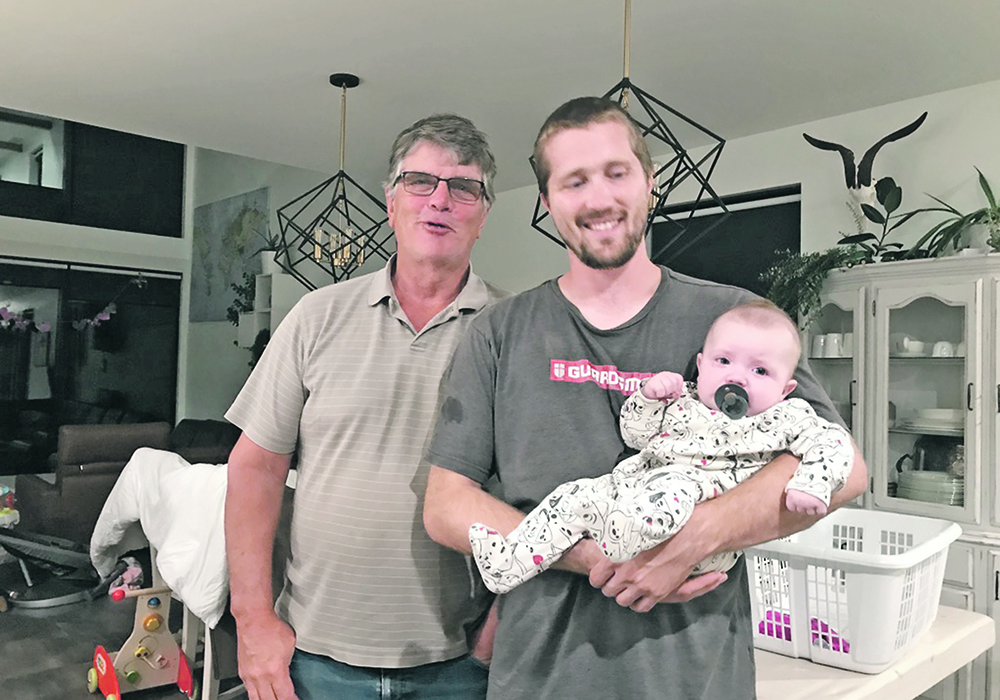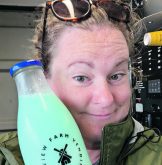On the Farm: Wes and Elaine Froeses’ ‘joy bond’ — their three grandchildren — live ‘59 steps away’ across the shelterbelt
Today when she looks out across the farmyard toward the grain elevator, all she can see is grey, rather than the usual sight of the rising sun.
But that doesn’t ruin her “quiet time,” when she thinks over her farm succession plan coaching business before the day’s busyness envelopes her.
“No matter how tough and heavy and weary this gets, my joy bond is right across the shelterbelt, 59 steps away,” said Elaine Froese on a frigid January morning, speaking from her farm office near Boissevain, Man.
Read Also

Nutritious pork packed with vitamins, essential minerals
Recipes for pork
Across the shelterbelt live her three grandchildren, Penny, Ruby and Read, all younger than four. Her son, Ian, and his wife, Kendra, live close by, and Ian is slowly moving deeper into the operations of the 5,000 acre and seed business family farm.
Husband Wes is always busy with farm activities, employing a love of agriculture he shares with Ian and inherited from his mother. His father, Abe, spent much of his time focused on his work as a pastor.
Elaine is a well-known coach on farm succession planning. It developed out of her work in home economics and then she took a coaching course in 2003, and decided to make succession the focus of her professional life.
“My trademark is finding harmony through understanding each other,” said Elaine. The approach is employed in the farm’s history, with Abe having passed off the seed business to Wes when Wes was only 22 years old.
Ian is now moving into running some of the farm’s seed operations.
That’s got Wes figuring out what he’s supposed to be doing on the farm.
“I’m right in the middle here, when I’m still quite capable of doing things. What am I supposed to do?” said Wes, after getting back to his office after moving some seed.
“What is my job? What are my responsibilities? If I do too much, he gets frustrated. If I don’t do enough he falls behind.”Passing on control is not just important to Elaine, from her experience with transition planning, but specifically to Wes, who was in an automobile accident and injured three years ago. That made him realize he needs to have the farm set up to keep operating if he gets disabled again.
“When I was lying in hospital, I thought, ‘I need to simplify my life,’ ” said Wes.
That meant making sure Ian was ready to take over, and for Wes to be able to back off.
“You really want your kids to be successful, so it’s more stressful than I would have thought, but it’s really enjoyable working with the next generation,” said Wes.
The family legacy in farm family leadership was recently recognized with a Nellie McClung Foundation Manitoba 150 Women Trailblazer award for not only Elaine, but also her mother Lois Edie, who died in 1998.
Lois was a long-time advocate for rural Manitobans and women.
That family commitment to improving farmers’ lives drew Elaine to Boissevain from Dugald in the first place. She was brought in by Jim Downey in 1978 to revive the local Manitoba Agriculture home economics efforts. She then met a guy.
“I married the local farmer,” said Elaine about the 1981 event.
While Elaine coaches others, she’s had to have support herself, notably when she suffered post-partum depression in 1984 and was hospitalized.
Later she learned to take care of dying relatives as Elaine’s mom and Wes’s father died within a year of each other in 1997-98, and then Wes’s mother and Elaine’s father died.
“I’ve done palliative care four times,” said Elaine.
Life around a farm is always a scramble, but Wes finds that things now are too slow, especially with seed season coming. That’s due to an unexpected complication: in the midst of building a new seed plant, the man in charge developed COVID-19 and was delayed by weeks, which is what’s happening right now.
There’s lots to do, but no way for him to do it all, so Wes is being patient.
The construction delays “get longer and longer and longer, but it’s all good,” he said, with his typical optimism.



















